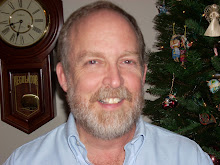Holy Free Fall?
I have a friend who is committed to bringing leaders in the Church in this region together for prayer to seek a genuine outpouring of God's Spirit. For many years I had been quite involved with the group he was gathering... but I became more and more "restless" (for lack of a better term) as I felt more and more keenly the brokenness of the Church. The issue that kept resurfacing in my heart was that this was a gathering of Protestants. We met on Protestant terms. It seemed clear to me there was no way Catholic and Protestant Church leaders would ever gather together for this kind of prayer meeting. Either the Protestants would have to become more Catholic (and that was likely not to happen with this bunch) or the Catholics would have to become more Protestant (which is likely never to happen in this region). What divided the two "camps"? The same thing that seems to always divide them...
I've not attended these prayer times for a couple of years, now. (My circumstances of changed and my schedule precludes me from being able to join them.) My friend (I'll call him Bob, which is not his real name), Bob, sends me e-mail regularly as part of a mass mailing to summarize what he sees and hears from the these gatherings, trying to discern what the Spirit is saying and doing. He often sends out mailings after personal prayer and reflection on scripture, again, attempting to "hear what the Spirit says" to the Church in our community.
Bob is rather prolific. I get e-mail from him several times a week. There is a lot of value in much of what he has sent out... things regarding the need for greater humility and repentance in the Church, the need for a much greater rejection of the cultural "norms," God's broken heart over lost souls, and much more. In a sense, Bob is a kind of prophet - not so much foretelling future events but speaking to people as a kind of mouthpiece of God. I like that about Bob.
But Bob is an independent. He's not associated with any congregation. He meets with a few people on a fairly regular basis... but there is no one group to which he "belongs." I don't mean to be judgmental but Bob is a typical Protestant... acting out his protest against the Church that Jesus Christ established through the earliest apostles and any "form" of church (deliberate use of lower-case "c") that disagrees with his ideas of what a church should look like and be doing.
My criticism of Bob isn't really about Bob but me. I read (albeit, slowly) the ante-Nicene writings of the early Church Fathers and wonder why I'm still in the denomination I'm in. Why am I still a Protestant? Am I still protesting? If so, against what am I protesting? I find fault with my denomination, with the this group of Protestants with whom I am associated, with 21st century Evangelicalism, with Protestantism in general... but I also find fault with Catholicism.
But maybe it's not so much Catholicism itself with which I find fault but with the way it is often demonstrated and popularly discussed... or just assumed. When I read the early Church fathers, I am so impressed with how and what they think, with how they lived their lives. I am impressed that so much of what Protestants have tossed out simply because "it's too Catholic" is discussed in the Church's earliest documents... things like the real presence of Christ in the Eucharist, the exaltation of Mary, the invocation of the saints in prayer, etc. I realize the Protestant movement was intended to be a "back to the Bible" movement, for the most part. But I have to wonder, if since the Catholic counter-reformation and, more recently, Vatican II, Protestantism isn't established simply for the sake of being "non-Catholic."
I think what I want is Bob's zeal and devotion to and for holiness and true Christian discipleship coupled with the early Church father's understanding and practice of what it takes for the true Christian to live the true Christian life in true relationship with the Lord of the Church.
There are groups identifying themselves as "Evangelical Catholics." I think that's at least part of what I'm looking for. There seems to be room in the Catholic Church for that sort of thing.
But I wonder if there are groups identifying themselves as "Catholic Evangelicals." I wonder if it's even desirable given the nature of Protestantism let alone if it's at all possible. And if there are such groups, then how do they understand apostolic succession? How do they reconcile the differences in that understanding with the earliest understandings of apostolic succession? We can’t just toss their understanding aside because it was that earliest understanding that enabled them to identify what it is that constituted the scriptures! And to challenge that means a challenge to the whole of the entire Judeo-Christian history. I don’t think much of the rest of the world would care (except for some being quite ecstatic about it) but it would throw the Church itself into a free fall with nowhere to land.
Maybe that’s precisely the problem with Protestantism – and especially Evangelicalism – today. Is there such a thing as “holy free fall?”


0 Comments:
Post a Comment
<< Home